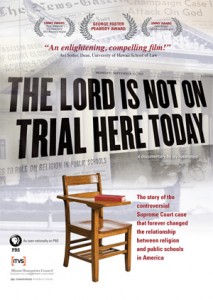Film Review: The Lord is Not on Trial Here Today

By Erin Williamson
In the 21st century, children in public school and their parents take for granted that the education system in the United States is secular, non-exclusive of religious minorities, and does not endorse one religion or worldview over another. Although the resurgence of the religious right has implicitly sanctioned the creep of Christianity into the school system—like a “School Prayer” banner at a public school in Rhode Island—the , the majority of Americans who support the separation of church and state can rest easy knowing that the Supreme Court decision that schools may not support religion in any way set the precedent for keeping religious proselytizing out of public schools. That decision, McCollum v. Board of Education, is the focus of Jay Rosenstein’s documentary “The Lord Is Not On Trial Here Today.”
Champaign, Illinois, a conservative Christian town, is the setting for the three year-long legal drama of Vashti McCollum–an atheist and mother of three who learned from her son Jim that his school sent home a permission slip for religious classes to be taught by educators from local churches during school hours.This film follows her challenge to society, local law, and lower courts, until the Supreme Court decisively vindicated her position with an 8-1 vote, disallowing school boards countrywide from using school funds, resources, or time to promote religion.
Rosenstein’s film is an engaging one. Most of the interviews, both first-person accounts and with legal experts, drive the story along, and it seems as though every one of the 56 minutes of the film is packed with narrative. The main focus is, of course, Vashti McCollum’s own personal commentary. She was not the average 1940’s cookie cutter June Cleaver housewife. This was a woman who challenged her neighbors, the religious atmosphere that permeated Champaign, and several courts of law. This was a woman who wasn’t afraid to fire her lawyer when he took the wrong approach to the case or to send her son to New York to live with his grandparents when his social skills were brought into question in the community and the cases. Even at 92, her age during the interviews, there’s no question she had more tenacity, fight, and courage than most. She speaks calmly yet emotionally about the way she was treated, the hate mail she received, and the challenges that threatened to make her a pariah, which I found the most compelling aspect of the film overall.
One of the best things to take away from the film, aside from the purely educational aspect, is that McCollum, a woman, humanist, and mother was so right. McCollum did not intend to attack religion or private religious practices—hence, the title of the film. She even fired her first lawyer for making the prosecution too centered on portraying religion as dangerous and threatening overall. Rather, her acumen can best be defined by the purely Constitutional approach. As a result of that 8-1 decision, the first case won on the basis of the famous Establishment Clause, the millions of nonreligious Americans today have a legal basis for the Jeffersonian wall of separation between church and state.
Erin Williamson is the development and communications assistant for the American Humanist Association and administrator for the Institute for Humanist Studies.
